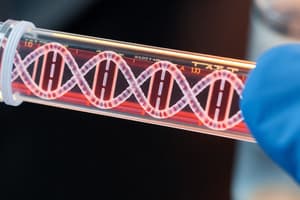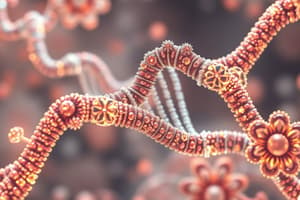Podcast
Questions and Answers
Who originally developed the polymerase chain reaction (PCR) in 1983?
Who originally developed the polymerase chain reaction (PCR) in 1983?
What is the primary purpose of a PCR?
What is the primary purpose of a PCR?
What is the temperature typically used for primer extension in PCR?
What is the temperature typically used for primer extension in PCR?
What is one of the applications of PCR in medical laboratories?
What is one of the applications of PCR in medical laboratories?
Signup and view all the answers
What is the first step in the PCR cycle?
What is the first step in the PCR cycle?
Signup and view all the answers
What type of PCR is used to amplify a specific DNA sequence in real-time?
What type of PCR is used to amplify a specific DNA sequence in real-time?
Signup and view all the answers
Study Notes
Polymerase Chain Reaction (PCR)
- Developed in 1983 by American biochemist Kary Mullis
- Aims to amplify a single or few copies of DNA to thousands or millions of copies
- Purpose: to make a huge number of copies of a gene
PCR Steps
- Thermal Denaturation: initial denaturation at 94ºC for 8 minutes, subsequent cycles at 94ºC for 1-2 minutes
- Primer Annealing: temperature and time depend on base composition, primer length, and concentration
- Primer Extension: typically carried out at 72ºC, close to the temperature optimum of Taq polymerase
Types of PCR
- Conventional PCR
- Real-Time PCR
- Nested PCR
- Multiplex PCR
- Reverse Transcriptase PCR
Applications
-
Research and Medical Laboratories:
- Gene expression assays
- Pharmacogenomics
- Human Leukocyte Antigen (HLA) genotyping
- Determine viral load in clinical specimens (HIV, Hepatitis)
- Bacterial identification and DNA quantification
Studying That Suits You
Use AI to generate personalized quizzes and flashcards to suit your learning preferences.
Description
Learn about the history and purpose of Polymerase Chain Reaction (PCR), a molecular technology that amplifies DNA copies. Developed by Kary Mullis in 1983, PCR makes thousands of copies of a gene.





